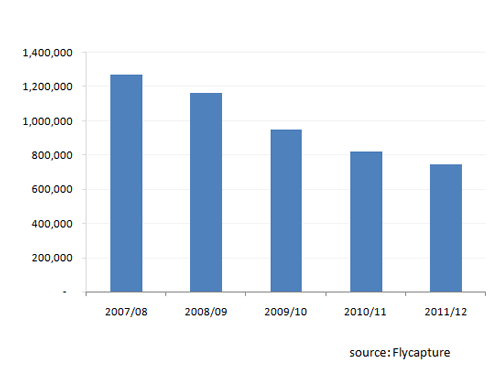Fly-tipping in England – annual statistics
Fly-tipping incidents in England have decreased by 9 per cent between the financial years 2010-11 and 2011-12 to around 744,000 incidents.
2011-12 Final Annual Estimates
Fly-tipping is the illegal deposit of waste on land contrary to Section 33(1)(a) of the Environmental Protection Act 1990. The types of waste fly-tipped range from ‘black bag’ waste to large deposits of materials such as industrial waste, tyres, construction material and liquid waste. Fly-tipping is a significant blight on local environments; a source of pollution; a potential danger to public health and hazard to wildlife. It also undermines legitimate waste businesses where unscrupulous operators undercut those operating within the law.
Local authorities and the Environment Agency both have a responsibility in respect of illegally deposited waste. Local authorities deal with most cases of fly-tipping on public land whilst the Environment Agency investigates and enforces against the larger, more serious and organised illegal waste crimes. Both collect data on their activity and are required to report this to the Flycapture database. Responsibility for dealing with fly-tipping on private land rests with landowners and is not subject to mandatory data reporting. Final estimates of local authority managed fly-tipping for England in 2011-12 were published on 18th December 2012 Official Statistics release 2011-12. These statistics are based on data submitted by all local authorities in England to the Environment Agency’s Flycapture system on the fly-tipping incidents reported to them and the actions that they have taken
Fly-tipping incidents in England 2007/08 to 2011/12
A summary of activity by the Environment Agency in relation to illegally dumped waste in 2011-12 is also provided further down the page.
Local authority managed fly-tipping: Headline results
- Local authorities in England dealt with over 744,000 incidents of fly-tipping, a 9% decrease [1] from 2010-11.
- Nearly two thirds of fly-tips involved household waste.
- Nearly 43 per cent of all fly-tips occurred on the highway. Most fly-tips consisted of a small van load of material or less.
- The estimated cost of clearance of fly-tipping to Local Authorities was £37.4 million, about a 9 per cent reduction over 2010-11.
- Local Authorities carried out around 490,000 enforcement actions at an estimated cost of £17.7 million. This is a 14 per cent decrease in actions over 2010-11.
- There were nearly 2,800 prosecutions, of which 99.6 per cent resulted in conviction.
[1] Some of this reduction is due to changes in the reporting arrangements of some local authorities
Statistical release for 2011-12
Data downloads:
Fly-tipping by local authority 2011-2012
Fly-tipping national level data 2007-2012
Local authority level fly-tipping: 2005-06 to 2010-11
Environment Agency action on illegally deposited waste in 2011-12
The Environment Agency is responsible for dealing with large-scale, serious and organised illegal dumping incidents which pose an immediate threat to human health or the environment.
Headline results
- In 2011/12 the Environment Agency dealt with 224 incidents of large-scale illegal dumping of waste in England.
Breakdown of large-scale illegal dumping incidents by waste type:
| Waste Type |
Number of large-scale illegal dumping incidents |
| animal carcass |
3 |
| asbestos |
23 |
| black bags – commercial |
2 |
| black bags – house hold |
6 |
| chemical drums, oil or fuel |
41 |
| clinical |
0 |
| construction/demolition/excavation |
53 |
| green |
6 |
| other (unidentified) |
8 |
| other commercial waste |
21 |
| other electrical |
3 |
| other house hold waste |
19 |
| tyres |
34 |
| vehicle parts |
4 |
| white goods |
1 |
| Total |
224 |
- The Environment Agency took forward 249 prosecutions in relation to illegal waste activities (including the illegal dumping or export of waste, or operating an illegal site), resulting in £1,367,340 of fines. The Agency continues to investigate and take enforcement action against increasingly serious and more organised waste crimes.
- The average fine was £7,596 where a fine was the outcome (an increase from £6,489 in 2010/11)
- Offenders prosecuted by the Environment Agency for waste crime offences have received a range of penalties from custodial sentences, curfew orders and in some cases had their assets seized.
Downloads
18 December 2012
- FINAL Official Flytipping Statistics Notice England 2011-12 (pdf, 284 KB)
- wrfg21-Natfly-201112 – for publication (xls, 35 KB)
- wrfg20-lafly-201112-for publication (xls, 230 KB)
- wfg22-lafly-2005-2010-201112 (xls, 270 KB)

